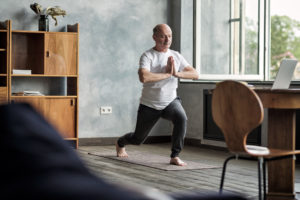
But what is a normal feeling while exercising? Should your heart be racing during a workout? Not necessarily. Sometimes your body needs to tell you to slow down—especially if you have an underlying condition like high blood pressure or heart disease.
General recommendations are for 150 minutes of moderate-intensity exercise per week. What does moderate intensity mean? It means a brisk walk where you can talk but not sing. Your heart might beat a little faster, and you may feel a bit of burn in your muscles.
But what’s too much?
Chest pain is one area to pay attention to. Discomfort in the chest during exercise means you should stop and sit down, calling a doctor if needed. It could indicate an underlying condition like high blood pressure or heart disease.
If you have one of these conditions, call your cardiologist.
Shortness of breath is another cause for concern. If you’re moving at a moderate pace or having trouble breathing doing something you could do a month ago, it could suggest a heart or lung issue.
Feeling faint or lightheaded could also symbolize a problem.
Sometimes drinking water can be a fix for lightheadedness.
Other times it could be a result of blood pressure medication. Blood pressure drops 30 to 60 minutes following a workout, and blood pressure-lowering medication can take it even lower.
If you feel lightheaded during exercise, it’s wise to stop, sit down, and take a drink of water. It could indicate high blood pressure, or in rare cases, a stroke.
These symptoms mean you’re overdoing it. Pushing through is not worth it. Stop, take a moment, and if you have an underlying issue, phone your doctor.
Experiencing one of these symptoms does not mean you should stop your exercise routine. After talking to your doctor, you can come up with a suitable plan and adjust intensity.
Exercise can have major benefits for your heart, so coming up with a properly executed approach for your specific situation can improve your condition in time.